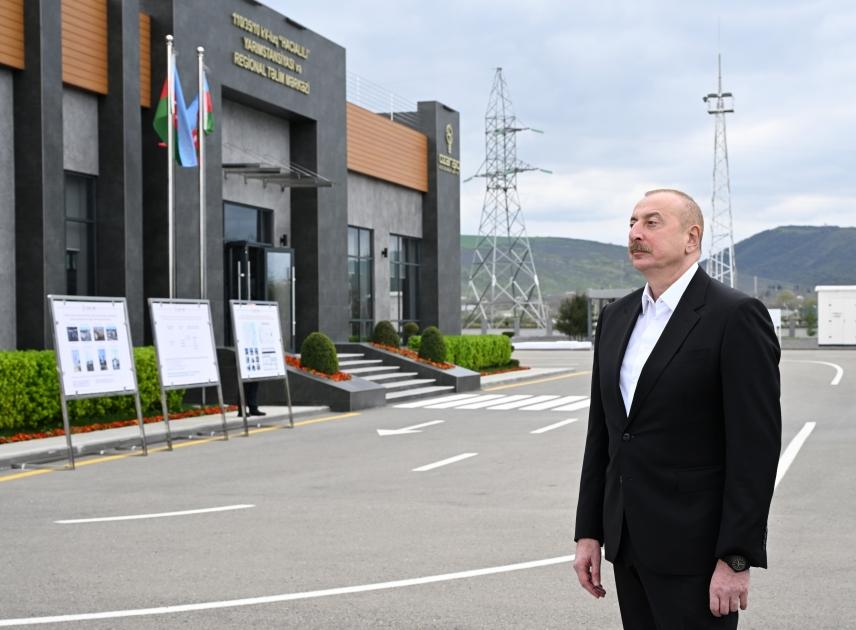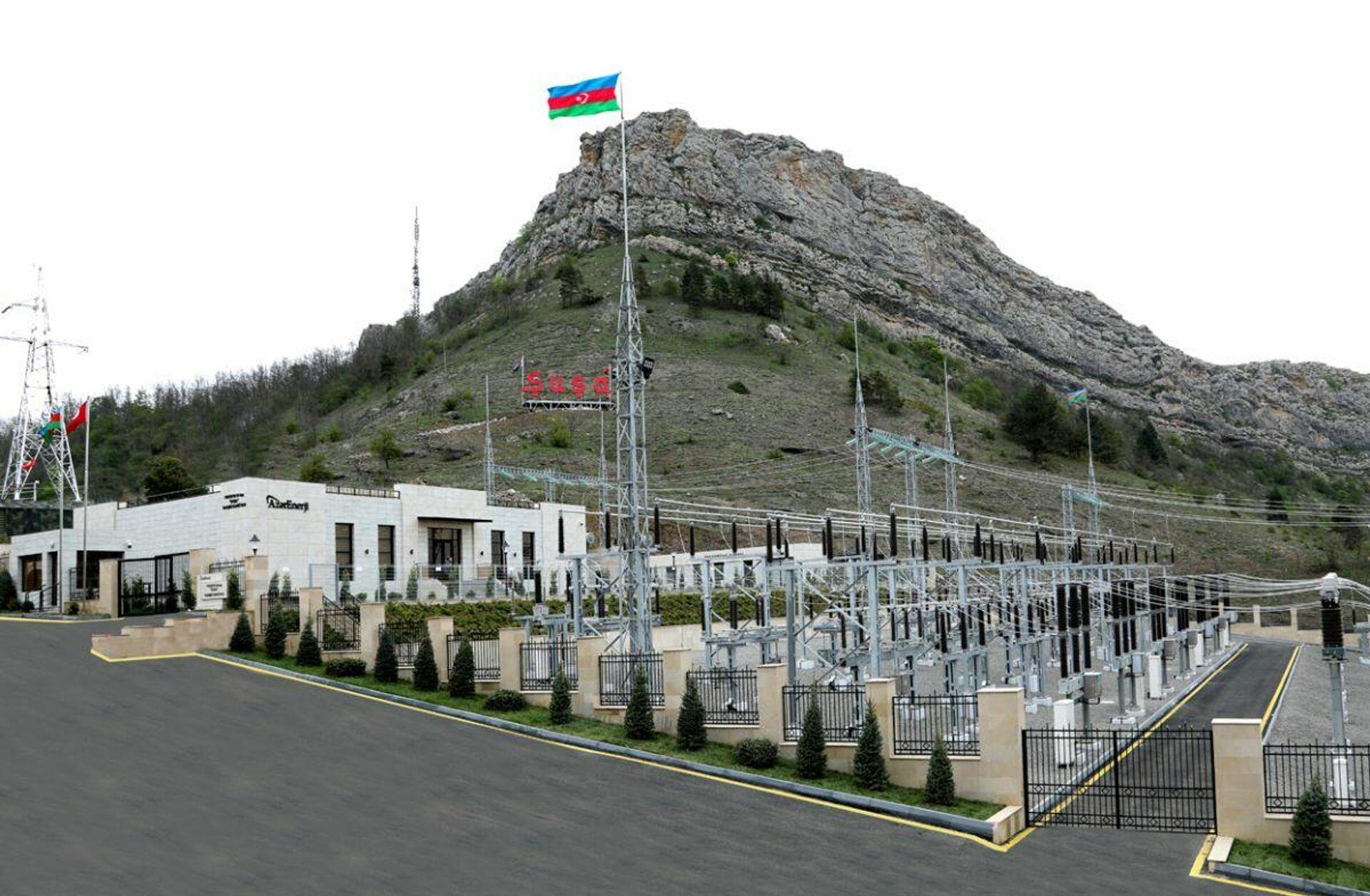Karabakh, renewable energy take priority in national development strategy Azerbaijan's energy renaissance
Large-scale investments in the development of power-generating capacities have allowed Azerbaijan to move from a country dependent on imported electricity to the position of the largest producer and exporter in the South Caucasus over the past 20 years.
The dynamics of commissioning of new facilities of the energy system has only increased in recent years, and its vector today is aimed at the revival of the Karabakh region and the development of renewable energy sources (RES).
At the same time, to maintain the stability of the energy system and expand its export opportunities, new facilities of the distribution system - transmission lines and substations - are being built. Thus, recently, another facility of the transmission system - the Hajialili substation - was put into operation in the Gabala district with the participation of Azerbaijani President Ilham Aliyev.
According to the tradition established over the past decades, within the framework of visits to the regions of the country, the head of state participates in the ceremony of laying or opening of infrastructure, production and social facilities, familiarizes himself with the activities of industrial and agricultural enterprises, etc. Tuesday's visit to Gabala district, Ganja and Hajigabul, during which President Ilham Aliyev attended the opening of roads, educational, medical, sports, energy and other facilities, was no exception.
Including with the participation of the head of state the commissioning ceremony of fully modernized 110/35/10-kilovolt electric substation Hajialili and Regional Training Center of Azerishig OJSC was held.
According to the information provided by the Chairman of the OJSC Vugar Ahmadov, the Gabala electrical network covers a total of over 31,500 subscribers, and as part of the reconstruction of the district's distribution network, the electrical facilities of the city of Gabala, two villages and 13 villages have been updated.
To improve the quality of the supply of electricity to consumers, the Hajialili substation was rebuilt in line with modern requirements, and its capacity from 26 megavolt-amperes (MVA) was increased to 41 MVA.

A Regional Training Centre has been built on the territory of the substation, consisting of a modern grid polygon and a "Green Energy" training polygon, equipped with modern equipment and integrated into the dispatch control system of regional grids.
It is planned to train qualified specialists in the field of electric power industry with the participation of local and foreign instructors, as well as to organize trainings close to real working conditions, with the study of the rules of operation of RES sources, etc. A charging station for electric vehicles has also been built near the Hajialili substation through the efforts of Azerishig specialists.
During the event, the head of state was informed about the rehabilitation and reconstruction works carried out in 2020-2023 in distribution networks, green and innovative technologies applied by Azerishig OJSC, as well as technical, economic and environmental efficiency of reconstruction in regional networks of power supply systems of more than 150 settlements within the framework of the "100 Villages" project.
The most important component of the reforms carried out over the past two decades in the energy system has been the reconstruction of the transmission and distribution system. It should be reminded that about twenty years ago the domestic power industry was not able to meet even the internal needs of the country: in 2001 the nominal installed capacity of the electric power system of the republic was 5181 MW, but in reality, taking into account the worn-out equipment and falling capacity of generators, this figure barely exceeded 4500 MW.
At that time, in the cities and villages of the country’s regions, the supply of electricity was carried out according to schedule; due to loads on power lines, worn-out substations and neighbourhood transformers, various types of accidents occurred, leading to rolling and staggered blackouts, etc.
Since then, Azerbaijan's power system has been qualitatively modernized, becoming the most powerful in the South Caucasus: its basis today consists of 22 large thermal and 30 hydroelectric power plants of various capacities, most of which are on the balance sheet of Azerenerji.
Taking into account small HPPs, solar, wind and other generating facilities owned by private investors, the total installed capacity of the domestic energy system is close to 8000 MW. Thanks to such a powerful generation potential, Azerbaijan has been a net exporter of electricity for about sixteen years, fully and reliably meeting domestic energy needs.
The republic also owes this to large-scale projects on laying new 500, 330, 220 and 110 kilovolt (kV) power transmission lines in the western, southern and northern directions, and, most importantly, radical reconstruction of existing and construction of new substations. Also, a large-scale program of modernization of the capital's power grid has been completed, a 220/110-kV ring system of more than two dozen substations of various capacities has been formed for the purpose of uninterrupted power supply to Baku and settlements of the Absheron peninsula.
Similar works are underway in the west of the country, in particular, Azerishig is preparing to build a new 110/35-kV Mərkəz (Centre) substation in Ganja.

It is noteworthy that in the last three years, key projects on the modernization of transmission system facilities have been implemented as part of the revival of the Karabakh and East Zangezur economic regions. These endeavours are also aimed at ensuring the connection of new renewable energy facilities to the country's energy system.
Thus, by the end of last year, specialists of Azerenerji OJSC repaired and built a dozen of substations and laid over 700 kilometres of high-voltage power lines with voltage of 330 and 110 kV in the liberated territories, connecting them to the general energy system of Azerbaijan.
Among other things, strategically important nodal objects of the transmission system were put into operation: this is the 330-110/35/10 kV Jabrayil nodal substation built within the framework of the Azerbaijan-Türkiye-Europe international energy corridor project, and the Azerishig Digital Control Center was established here.
It should be reminded that in order to implement the initiatives on transit of Azerbaijani electricity to Türkiye, a new high-voltage power transmission line will be laid from Jabrayil substation towards Nakhchivan Autonomous Republic (NAR), and reconstruction works on three substations - Sadarak, Nazarabad and Ebragunus with 35/10 kV capacity each will start soon in Nakhchivan.
At the same time, in Karabakh, the 110/35/10-kV Agdam junction substation has already been put into operation, from where a 110-kilovolt transmission line is currently being laid in the direction of the Shusha and Fuzuli substations of similar capacity.
Also, the 110-kilovolt substation Gorchu in Lachin district and city hub substation Lachin are already in operation, while a new 35/0.4 kV substation and Control Center are under construction in neighbouring Kalbajar, a 110/35 kV substation is being built in Istisu territory, and 35-kilovolt transmission lines are being laid.
In general, as a result of the work performed, a circular power supply scheme will be created connecting the power grids of the Kalbajar and Lachin districts. At the same time, against the backdrop of solar and wind power plant construction projects being implemented in Azerbaijan, the formation of infrastructure for the transmission of electricity generated by renewable energy facilities to the country's energy system has begun.
The European Bank for Reconstruction and Development (EBRD) acts as a partner of Azerbaijan in these endeavours: in the near future, the Board of Directors of Eurobank will approve a $30 million loan to Azerenerji, and these funds will be used to purchase autotransformer equipment for substations under construction in the country.
In particular, the modernization of substation equipment will help increase the flexibility of Azerbaijan's energy system, which is necessary for the integration of renewable energy capacities: it will be possible to connect planned green generation facilities into a single grid, which is currently difficult due to a number of technical limitations.








